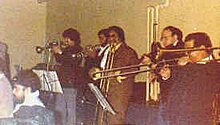Chino Rodriguez
This article has multiple issues. Please help improve it or discuss these issues on the talk page. (Learn how and when to remove these messages)
|
Chino Rodriguez | |
|---|---|
 | |
| Background information | |
| Birth name | James Mui |
| Born | February 2, 1954 Manhattan, New York City, U.S |
| Died | November 5, 2022 (aged 68) |
| Genres | Salsa, Latin jazz |
| Occupation(s) | Trombonist, impresario |
| Instrument | Trombone |
| Years active | 1965–2022 |
| Labels | SALSA / Mary Lou Records, Oriente Music Group |
| Website | Latin Music Booking Oriente Music Group (OMG) |
James Mui, known professionally as Chino Rodriguez, was an American musician and impresario who specialized in Latin music, salsa and Latin jazz.
Biography
[edit]Rodriguez was born as James Mui on February 2, 1954, in the Little Italy/Chinatown area of Manhattan, New York City. He was born to a Chinese father, Cheung Mui (Chinese: 梅莊, Méi Zhuāng), who obtained U.S. citizenship by joining the Merchant Marines during World War II, and a third-generation Puerto Rican mother, Gloria Figueroa Rodríguez.[1]
Early music career
[edit]This section of a biography of a living person does not include any references or sources. (July 2016) |
Rodriguez studied music at Junior High School 65 in Manhattan's Lower East Side. He began his musical journey as part of Orchestra Dee Jay, initially as a band boy before occasionally singing as a coro (chorus) member. In 1968, he formed his first band, "Chino Rodriguez and His Orchestra," performing at local weddings and private events. Between 1970 and 1974, he participated in the New York City Department of Parks' arts program through the American Federation of Musicians Local 802.[2]
Recording career
[edit]Rodriguez recorded two albums for Ismael Maisonave's label, Salsa Records: Maestro De Kung-Fu,[3] produced by Andy Harlow, and Si Te Vas Mi China,[4][5] produced by Larry Harlow.

Maestro de Kung-Fu contained "La Computadora," the first Latin recording using a MOOG synthesizer, played by Larry Harlow.[6] Cuban pianist Alfredo Rodriguez played on "Moonlight Serenade." Chino Rodriguez y La Consagración was nominated for Latin New York Magazine's award for Best New Band.[7] Rodriguez's second album, Si Te Vas Mi China, was recorded in 1976 after a year's worth of daily rehearsals. It produced two hits upon its release in 1977 and, like his debut album, achieved gold status.[citation needed]
Latin Music Impresario
[edit]This section of a biography of a living person does not include any references or sources. (July 2016) |
Rodriguez began working part-time at Fania Records as a teenager, after Fania was about to purchase Salsa Records. On the record label, Chino Rodriguez recorded and began helping with the booking of the Fania All-Stars.[8] Then Rodriguez moved on to working as an independent booking agent representing many of the Fania artists such as Larry Harlow, Ismael Miranda, Junior Gonzalez, Bobby Valentine, and many other Fania Greats. Rodriguez returned to working full-time in the business side of the music industry in 1991, becoming Senior Vice President and General Manager of the newly formed Hidden Faces Records. After organizing business operations for Hidden Faces, he opened his own artist management company, Chino Rodriguez Management (C.R.M.), and booking agency, OMNI Latino Entertainment (OLE). His offices were opened in Brooklyn, New York.[9] In 2011, Rodriguez represented Latin hip hop artists Proyecto Uno, bachata artist Domenic Marte, reggaetón duo Edgardo y D'niel, and bachata artist Alfred Martinez. Chino presently worked with many reggaetón and rap artists and lived in Florida.
Discography
[edit]- Maestro De Kung-Fu, SALSA Records, 1976. Re-released on CD in2004 by Mary Lou/SALSA Records.
- Si Te Vas Mi China, SALSA Records, 1977. Re-released on CD in 2004 by Mary Lou/SALSA Records.
References
[edit]- ^ Lapidus, Benjamin. "Chinita Linda: portrayals of Chinese and Asian identity and culture by Chinese and non-Chinese in Spanish Caribbean dance music." Chinese America: History and Perspectives, annual 2015, pp. 17+. Gale Literature Resource Center,
- ^ "Chino Rodriguez Bio (Orig From Wikipedia)". SlideShare. 2015-05-16. Retrieved 2025-01-24.
- ^ "Salsa Canal blog". Blogger. Retrieved 2013-01-11.
- ^ "LP Latini... Salsa y merengue blog". Blogger. Retrieved 2013-01-11.
- ^ "Mi Melodia blog". Blogger. Retrieved 2013-01-11.
- ^ "Chino Rodriguez "Cheung Mui"* Y La Consagracion* – Maestro De Kung Fu". Discogs.
- ^ Izzy Sanabria, Latin NY, May 1975
- ^ Muriel, Tommy (2006). Fania All-Stars: Salsa, Inc.: [Cuatro décadas (y pico) de Nuestra Cosa Latina]. Fania. p. 189. ISBN 9781618872364.
- ^ "Chino Rodriguez Biography, Age, Height, Wife, Net Worth, Family". Celebrity Age Wiki. Retrieved 2024-11-17.
Sources
[edit]- Flores, Juan. From Bomba to Hip Hop: Puerto Rican Culture and Latino Identity. New York: Columbia University Press, 2000; ISBN 978-0-231-11077-8
- Leymarie, Isabelle. Cuban Fire: The Story of Salsa and Latin Jazz. New York: Continuum International Publishing Group, 2002; ISBN 978-0-8264-6566-5
- Washburne, Christopher. Sounding Salsa: Performing Latin Music in New York City. Philadelphia: Temple University Press, 2008; ISBN 978-1-59213-316-1
